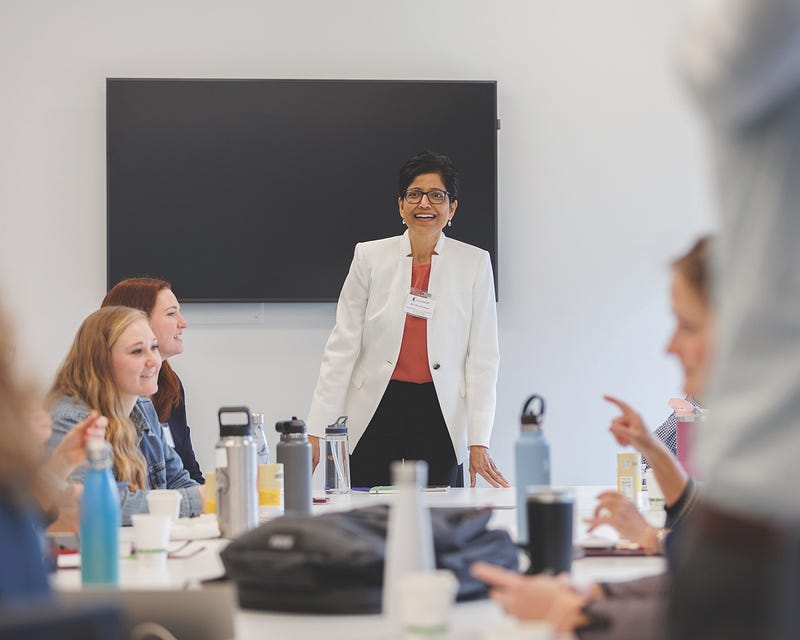Future of Business
New sustainability institute at McCombs combines profit and purpose for positive change

It’s hard to talk about the future of business without underscoring a term that is gaining increasing significance: sustainability.
In the rapidly changing business world, sustainability is considered the key to unlocking a better future for coming generations. The term typically
describes the practices of companies that seek to build long-term value without hurting the environment or society. Sustainability is driving
business culture. In turn, schools such as McCombs with a focus on the future are acting on that demand.
Now, UT’s new Global Sustainability Leadership Institute, a cross-campus initiative housed at McCombs and a partnership with the Moody College of Communication, is taking a comprehensive look at sustainability in all its business manifestations, including corporate, financial, infrastructure, and communications. The institute’s vision is to promote “a world where profits
and purpose meet to drive positive change.”
Its roots are in the Social Innovation Initiative, which began in 2017 as a hub at McCombs for the UT community to explore social entrepreneurship
and corporate social innovation. It morphed into a full-fledged institute, which launched in the fall of 2021. This past fall, the institute began
offering a new interdisciplinary minor in sustainability to students across campus.
“This is part of what’s needed to make sure that Moody and McCombs stay cutting-edge educational institutions going forward,” says Professor of Accounting Jeffrey Hales, the institute’s executive director.
“There are quite a number of initiatives I’m seeing pop up at various universities, but I would say this is one of the more significant ones,” he says. One of the new institute’s innovations is its inclusiveness: It’s open to UT students and faculty members across campus.
Because overall interest in sustainability has risen sharply, Hales says the focus must be on “how it relates to the intersection of business and society and the planet.”
His predecessor is Laura Starks, a finance professor who was the institute’s inaugural executive director and now serves as an advisory director. Starks, along with Steve Limberg, an accounting professor, were co-executive directors of the institute’s predecessor organization, the Social Innovation Initiative. Starks says students were the drivers to create the original effort.
“There is a lot of student demand for learning more in this area,” Starks says.
To further the effort, Meeta Kothare, a professor of practice in finance and management at McCombs and at the LBJ School of Public Affairs, developed the initiative and oversaw its shift from initiative to institute. She credits what she calls “a game-changing gift” in 2020 from Chris Bake, BBA ’88, and his wife, Cynthia. Bake lives in London London, a member of UT’s International Board of Advisors, and a member of the executive London, a member of UT’s International Board of Advisors, and a member of the
executive of the executive committee at Vitol, a multinational energy and commodity trading company.
Now managing director of the institute, Kothare is passionate about it, saying global business cannot continue to act as it once did.
“This is not just environmental intervention,” she says. “We have to protect the planet but also human rights, and develop inclusive technology and other innovation. Of all the things we could be doing today, to me, sustainability is the most important issue to address.”
Kothare describes her view of sustainability as “the ability of current generations to meet their needs while protecting the ability of future generations to support their needs.”
The Leadership in Global Sustainability minor was launched in fall 2022 with 15 students.
“What’s major about this minor is it gives the students the interdisciplinary approach to leadership in global sustainability,” says Starks.
Hales, who holds the Bake Chair in Global Sustainability Leadership, says making most of the institute’s activities — not just the minor — open to students across campus will give all UT undergraduates “concrete ways to signal to companies that they understand the changing nature of what’s expected of businesses.”
With space in Rowling Hall for graduate students and in the College of Business Administration building for undergraduates and institute staff members, Kothare says her goal is to“make sustainability education available to all students on campus.”
“Our actions now will determine the future of our planet and life on it,” she says.
— Sharon Jayson
This story appeared in the Fall 2023 issue of McCombs magazine.
About this Post
Share:


